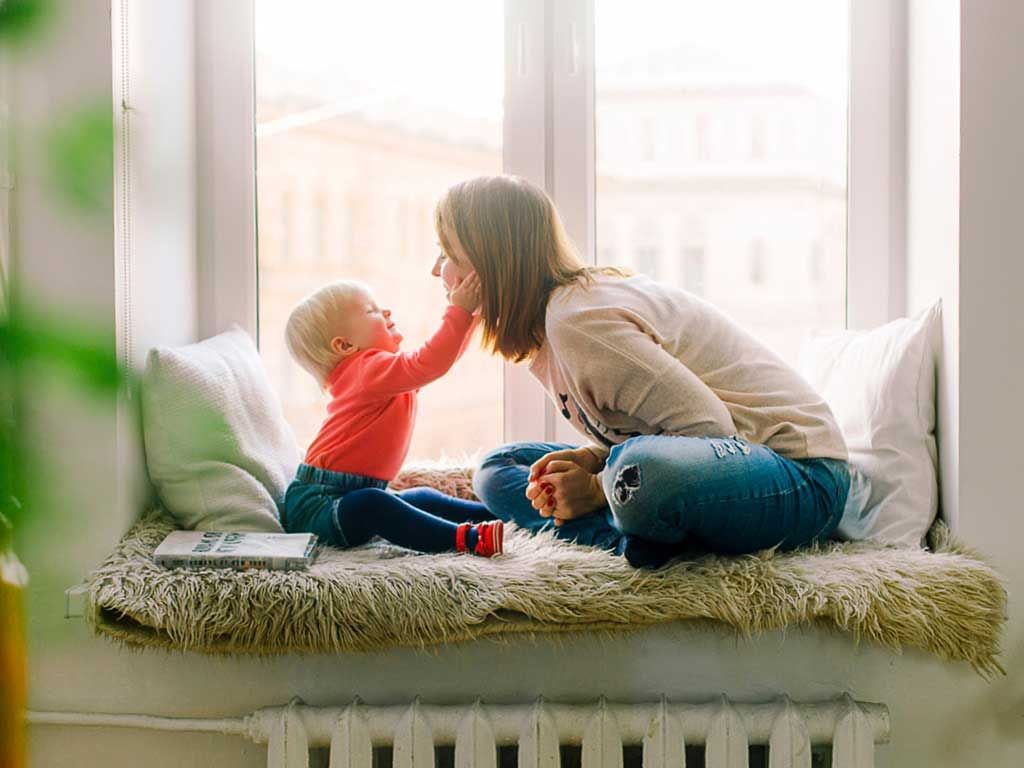
It's not too early to begin "baby-proofing" even before you bring your baby home. Crawl around on your hands and knees, at baby level. Look for things that can hurt your child.
Your baby will crawl before you know it. Changes can happen quickly, before you even realize what your baby is capable of getting into.
General Living Area
- Always be on the lookout for items that baby can choke on: coins, small toys, toy parts, buttons, pins, latex balloons, plastic bags are examples. Keep purses and pocketbooks out of reach.
- If an object can fit through a toilet paper roll, it is small enough for a baby to swallow and choke on.
- Put plug protectors over all outlets.
- Keep electrical cords tied or taped up.
- Cover sharp corners on furniture with corner guards.
- Watch for things that can be pulled over. Anchor your heavy furniture to the wall. Secure floor lamps. Make sure your little one can't pull open the door of the dishwasher or oven.
- Install wall-mounted gates at the top and bottom of stairs.
- Use locks or child-guard latches on all doors, cabinets and drawers. Little ones get into everything.
- Shorten, remove or secure window blind cords. Babies can get tangled up and strangle.
- Be very careful with fire hazards like candles, matches, fireplaces and space heaters.
- Make windows child safe. They should not open more than 4 inches or a child can fall out.
Baby’s Bedroom
- Always put baby to sleep on their back.
- Never put anything in the crib with baby, including soft bedding, stuffed animals and blankets.
- Take down mobiles when baby is 5 months old or can push up on hands and knees.
- Never leave baby alone on the changing table.
- Use a toy chest without a lid or with a lid that holds open. Baby can suffocate if he crawls in and the lid closes.
Bathroom
- Set hot water heater to 120 degrees.
- Test the water temperature before you put baby in the bath water. Don't use bath or baby oils.
- Never leave baby alone in water, always keep a hand on him. Don't use a bath ring; they are not safe.
- Use slip proof mats inside and outside the tub.
- Keep the toilet lid closed. This helps prevent drowning or the lid slamming on baby's head or hands.
- Keep all medicines, vitamins, creams, make-up, cleaners, toothpaste, etc. out of reach and locked up. These are poisonous to your baby.
- Keep hair dryers, curling irons, electric shavers unplugged and out of reach. Even better, keep them in a room away from the baby.
Kitchen
- Keep all cleaning supplies and dangerous products out of reach and locked up. Empty a bucket of water after using it. Baby can drown in only 2 inches of water.
- Keep knives, scissors, and sharp objects out of reach. Make sure a toddler can’t climb up on an opened drawer and get into dangerous things.
- Cook on the back burners, and keep pot handles facing back.
- Never heat a baby bottle in the microwave.
- If you cook other food for your child in the microwave, always stir it, let it sit 30 seconds and test the temperature before you feed it to your child.
- At mealtime and snack time, put hot foods in the center of the table.
- Avoid tablecloths and placemats that can be pulled.
- Never carry hot food or liquids when carrying your baby.
Basement, shed, garage
- It is best to make these areas off-limits for children.
- Keep items like windshield wiper fluid, antifreeze, paints, thinner, cleaners, etc. out of reach and locked up.
- Make sure garage door openers automatically stop or reverse to prevent children from being trapped or crushed under the door.
Home Safety for the Entire family
- Have a smoke alarm on every floor. Change the batteries every 6 months.
- Have a carbon monoxide alarm in your home.
- If your home was built before 1978 have it tested for lead paint. If it was built before 1988, have your tap water tested for lead.
- Test for Radon. Radon is an odorless gas that comes from the ground and can get into your home. It can cause lung cancer. You can buy test kits at many retail stores. For more information call the National Radon Helpline at 1-800-557-2366 or go to www.epa.gov/radon.
- Keep guns unloaded and locked up, or not in your house at all.
- Protect your baby from second-hand smoke; it is very dangerous. Do not let anyone smoke around your baby.
- Don’t leave your little one alone with your dog, the dog food or dog toys.
Final word
Nothing replaces constant adult supervision. Know where your child is all the time. If you need to cook, answer the phone or just relax, put the baby in a safe place like a crib or swing.
Information from noodlesoup.com.

